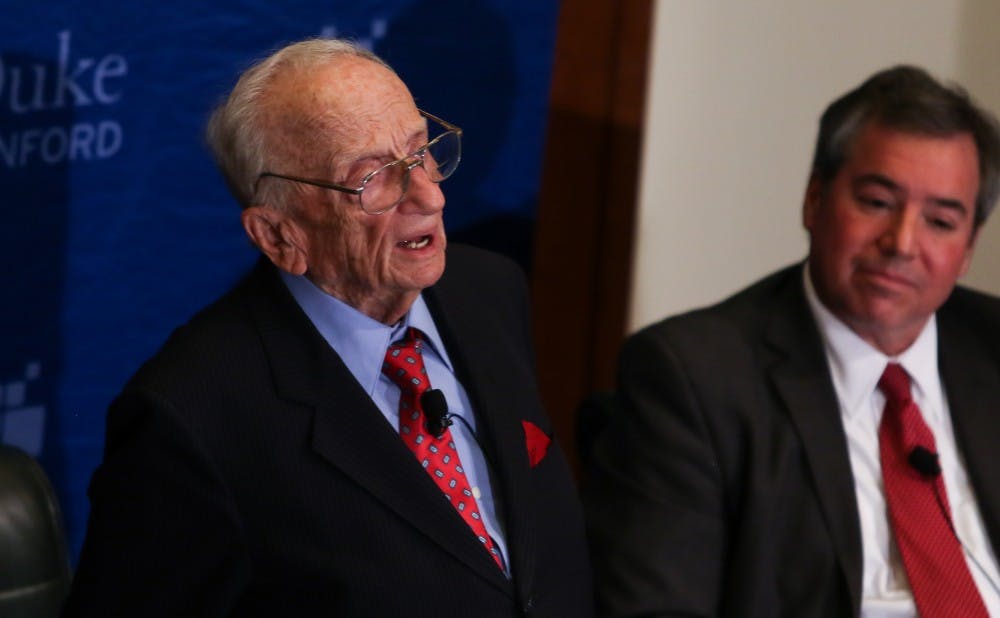Ben Ferencz, the last living prosecutor from the Nuremberg trials, advocated for “law, not war” to a crowd of several hundred packed into Sanford Fleishman Commons and other adjoining rooms Wednesday.
At 27 years old, Ferencz became the chief prosecutor for the U.S. Army at the Einsatzgruppen trial—his first case—which tried 22 defendants for the murder of more than a million people. Deemed “the biggest murder trial in history” by the Associated Press, the trial resulted in the conviction of all the defendants. More than 70 years later, he reflected on his experience at Nuremberg, highlighting how the trial changed perceptions of war and international crimes against humanity.
“War had always been glorified. It was a national right, a right of sovereignty. It was hailed as a road to power and prestige, [but at Nuremberg], war was condemned as an international crime [for the first time],” Ferencz said during a discussion mediated by his son Donald Ferencz, a renowned international lawyer, and Duke alumnus Michael Scharf, Trinity '85, Law '88 and dean of Case Western Reserve University School of Law.
Born to a Jewish family in Transylvania, Romania in 1920, Ferencz emigrated to the United States when he was 10 months old and moved into Hell’s Kitchen in New York. After graduating from Harvard Law School in 1943, Ferencz enlisted as a private in an anti-aircraft artillery battalion in the U.S. Army.
While serving in Europe, Ferencz witnessed the horrors of World War II and the Nazi concentration camps, which he described as “incredible, unbelievable, unimaginable.”
He was honorably discharged from the Army in 1945, but was quickly recruited to serve on the prosecution team for the International Military Tribunal at Nuremberg against Nazi leadership. He noted that the Nuremberg trials aimed to hold individuals responsible for their criminal actions.
“Crimes are committed by individuals—not by nations, not by groups—but by people,” Ferencz said.
Following the Nuremberg trials, he continued to seek justice for the victims in the form of restitution, which he referred to as the “most important achievement of his life.”
During the talk, Ferencz identified religion, nationalism and economic circumstances as the three main causes of war. However, he added that war can turn anyone into a killer, concluding that aggression underlies all war crimes.
“Wars make murderers out of otherwise decent people in all countries on all sides,” Ferencz said.
The talk concluded with Ferencz asking the students in the room to end all conflicts by making use of the legal system since “peace and harmony is what law is all about.”
“Get with it kids—the world has changed, and the politicians and diplomats don’t recognize that,” Ferencz said. “Of course, [we can’t] end all wars, but we can certainly make a big dent into it. I know that we can do the impossible. If this little guy from Transylvania can do it, why can’t you?”
Student reactions to Ferencz’s call to action were mixed. Sophomore Max Cherman was critical of whether or not law would always be the best solution, noting that military force is sometimes necessary depending on the context of the conflict.
Sophomore Elliott Davis, however, said that although he was saddened by the atrocities deliberately committed by people in the world, he felt inspired by Ferencz’s speech.
“As Mr. Ferencz described, we must prevent further crimes against humanity by relentlessly committing ourselves to tolerance and peace,” Davis said.
Get The Chronicle straight to your inbox
Signup for our weekly newsletter. Cancel at any time.

